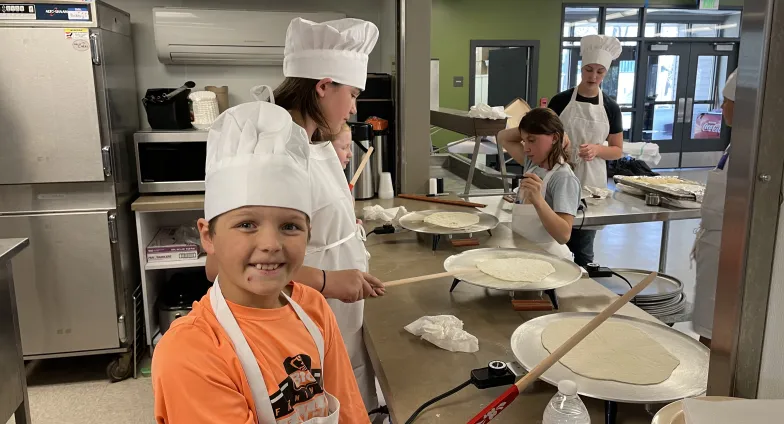Chef For a Day Grill Off
The inclusion of beef in young people’s diets and hands-on culinary learning has the potential to influence both health and life skills, both of which could contribute to the mission of 4-H, North Dakota’s state and national Beef Checkoff Program priorities. Investing in young people by teaching the art and science of safely preparing beef in an outdoor setting can provide 4-H youth with life skills, food literacy, and lifestyle choices for healthy living and potentially, career development skills.
Objectives
- Increase youths’ interest in and knowledge of beef products
- Increase youths’ interest in and knowledge of grilling techniques and methods
- Increase youths’ interest in and knowledge of meal planning and food preparation
- Help youth gain knowledge of food safety and preparation
- Provide youth with a hands-on culinary learning opportunity to help them learn about meat products and preparation, and the importance of protein in the diet
- Help youth develop life skills, food literacy and leadership abilities, and enhance their communication skills and self-confidence while improving their decision-making skills and ability to make healthful food choices
Age Divisions
4-H’ers and other participants 11 to 18 years old are invited to join the fun.
- Junior division – ages 11 to 14
- Senior division – ages 15 to 18
Event Guidelines
- Participants may compete as an individual or as a county (or combined county) team of three to four members. Small teams may be merged with teams from other small counties. Each team may include a mentor (youth or adult volunteer, industry producer, parent, chef or food industry worker) who can coach the team through the preparation period. The mentor must not do the team’s work. Counties can enter multiple teams. In the event equipment is limited during a face-to-face event, counties may be restricted to a number of teams that may enter.
- The 4-H’ers should prepare the selected recipe enough times before the contest to be familiar with it. When the contest is held in-person, do not bring the dish already prepared to the contest. Participants should practice the recipe in the presence of a parent or guardian prior to the contest.
- The team will prepare the main beef entrée and a side dish (salad, skillets or omelet, etc.) featuring North Dakota-grown products. Participants are encouraged to use up to three additional special ingredients (no home-processed products) to make their dish original. No refrigeration will be provided when the event is held in-person. This means participants can bring only unopened items in original packaging or containers such as cans, bottles, or bags.
- Participants must follow proper food safety procedures during preparation of the dish.
- Face-to-face event: Participants will prepare their recipes, transfer the dish to the provided serving plate and add any garnish before placing it on the judges’ table.
- Virtual event: Participants will prepare their recipes, take a picture from the top/side of the plate to show presentation of dish and a second picture with your main dish cut open so the judge can see the inside of your entrée.
- Basic grilling equipment (grill, skillet, spoons, spatulas, measuring cups and mixing bowls, cutting boards, knives, vegetable peeler, can opener, power cords and hot pad holders) will be provided to use in preparation of dishes when held in-person.
- Accessories such as place mats, napkins, flowers or figurines are not allowed.
- Each team/individual must submit a copy of the recipe. An 8½- by 11-inch document holder, paper and markers will be provided when event is held in-person. The recipe should include ingredients, preparation instructions, and serving size.
- Participants will give a brief (three- to five-minute) oral presentation on their final food product. For example, a participant may discuss the preparation process, nutritional information or facts and estimated cost. When held in-person, a panel of judges may ask the contestants questions. For the virtual contest, participants will submit a 3 minute video discussing their product.
- 4-H’ers should wear close-toed shoes and long pants when grilling, for safety reasons. 4-H’ers should be well-groomed. When possible, 4-H’ers should be wearing a 4-H shirt with the 4-H logo. Participants should secure their hair so loose hair cannot fall into the dish being prepared. Wearing a ball cap is an acceptable method.

